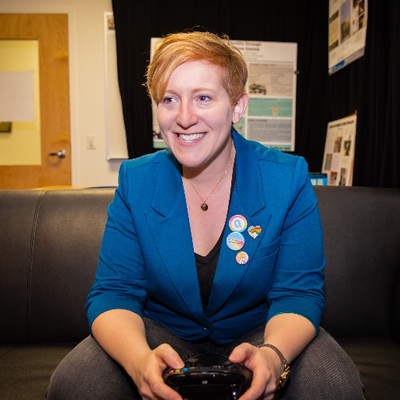I’m in the midst of co-organizing The Queerness and Games Conference (QGCon) a Berkeley’s Center for New Media, and I’m excited. The event is bringing together academics and game developers to talk about a variety of topics at the intersection of LGBT issues and video games: representation in games themselves, discrimination in the industry, but also how to combine queer studies and games studies. We’re aiming for something of an un-conference model, with traditional panel presentations, but also interactive workshops and maybe even a mini queer games jam. That’s happening the last weekend in October. Psst, keep an eye out for more info soon, including registration and a call for papers!
Maybe the most exciting part, however, is that it feels like, at this very moment, something is suddenly happening in queerness and games. In addition to our October conference, EA just held its half-day event Full Spectrum, which touched on similar issues in the industry (with mixed success, apparently, but all dialogues are good dialogues). Gamer X, “the first gaming and geek lifestyle convention with a focus on LGBTQ culture,” is happening this August in San Francisco. Now there’s a Kickstarter for a full-length feature documentary “exploring the queer side of gaming and LGBTQ presence in the game industry,” which has already raised $25,000+.
I’ve been a part of the games industry, in one form or another, for nine years now. (Wait, seriously? How old am I? Terrifying.) When I started out in 2004 as a games journalist who focused on gender and sexuality, I felt like one of the only voices in a vast crowd of people who insisted that “there was nothing gay about video games.” Even suggesting that we talk through these issues got me elaborate hate mail, even death threats. Just a few years back, when I presented to an auditorium of game development undergrads about implementing queer friendly design, I was met with comments like, “It had never occurred to me to put gay people in my games.”
Today, something is in the air. I’m thrilled to be re-entering the industry as a games academic at just this moment. I’m excited to see the industry begin to shift. I’m excited to see the conversations become complex and meaningful. I’m excited to see how games studies can meet queer studies. And I’m ecstatic that, when I talk to people about a Queerness and Games Conference, I’m met with support, enthusiasm, and understanding. After so many years of fighting for the legitimacy of exploring LGBT issues and games, it means an enormous amount to me every time somehow says, “Yes, that event it just what we need.”

